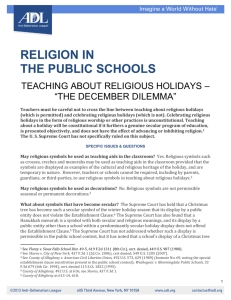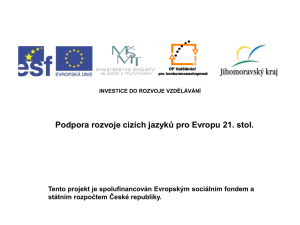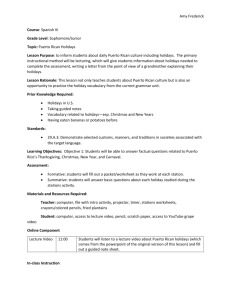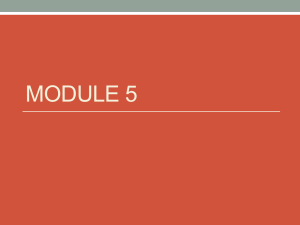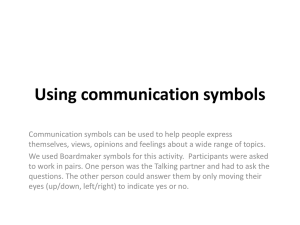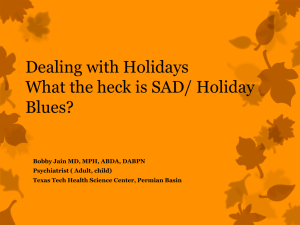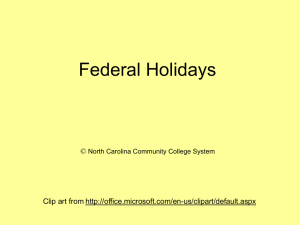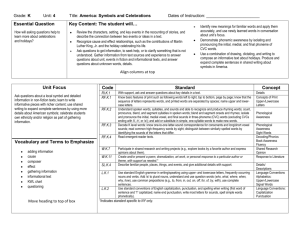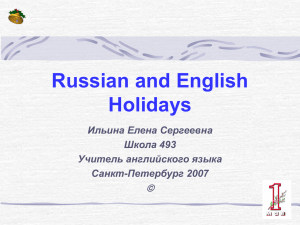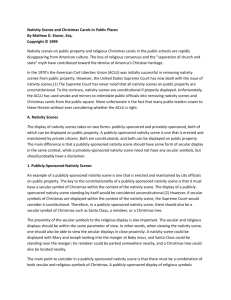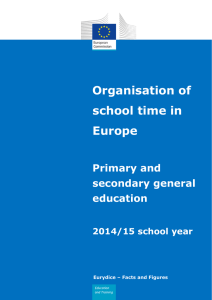HOLIDAYS AND RELIGIOUS CONSIDERATIONS
advertisement
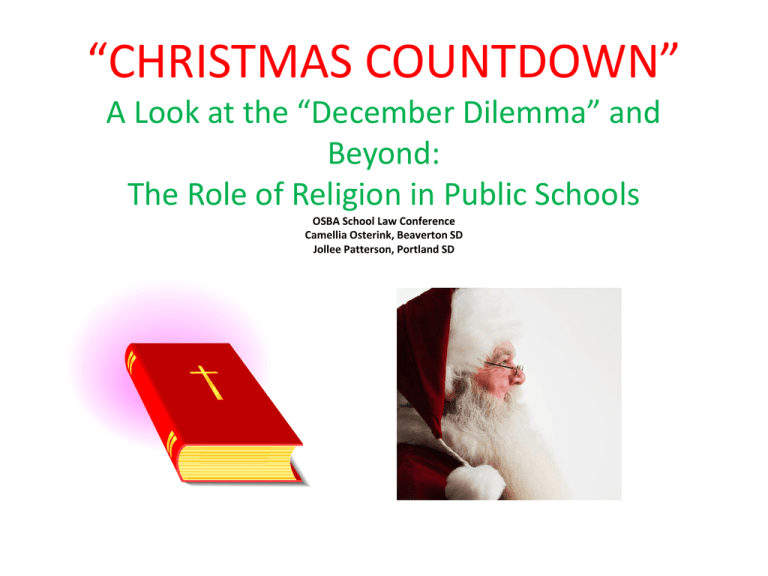
“CHRISTMAS COUNTDOWN” A Look at the “December Dilemma” and Beyond: The Role of Religion in Public Schools OSBA School Law Conference Camellia Osterink, Beaverton SD Jollee Patterson, Portland SD Which headline do you want? • “School bans Christmas!!!!” • “Students wash feet in school sinks!!!!!” • “Kindergartners make ‘Happy Birthday Jesus’ cards in school!!” • School celebrates pagan holidays!!!” WHAT’S A SCHOOL TO DO??? It all starts with the First Amendment “Congress shall make no law respecting an establishment of religion, or prohibiting the free exercise thereof.” Schools cannot endorse or promote religion. Schools cannot inhibit the free exercise of religion by students or staff. How do schools navigate these waters? The Lemon Test In Lemon v. Kurtzman, the Supreme Court established a three-part test to determine whether government engagement in religion is permissible. 403 U.S. 602 (1971) • Is there a legitimate, non-secular purpose for the activity? • Does the primary effect of the activity neither advance nor hinder religious belief or practice? • Does the activity foster excessive government entanglement with religion? Holiday parties • Classroom parties during the holidays must have a secular focus. – Teachers should avoid displaying only those secular themes that are associated with Christmas. • Christmas trees and Santa Claus are considered secular symbols, but a non-Christian student may be uncomfortable during a classroom party that includes only these types of symbols. • Classroom parties should be limited in duration • If the party includes a craft project, students can voluntarily include religious symbols as an expression of their religious faith, but cannot be required to do so. Holiday concerts • Holiday concerts should focus on non-secular songs, and can include music from a variety of cultural and religious traditions. The program should not focus only on Christmas-related selections. • Similarly, student theatrical performances related to the holidays should be secular in nature, and should not focus on overtly religious themes. – For instance, students could dress up as snowmen, but it would not be appropriate for students to reenact the Nativity scene. Holiday Displays • Limited secular displays in the public areas of the school are acceptable. This includes Christmas trees, Santa Claus and “Seasons Greetings” banners. – Keep in mind the diversity of your community in deciding whether secular display are appropriate • Displaying religious symbols of one particular faith is not acceptable. For instance, it would not be appropriate to just display a nativity scene or a menorah. • As part of teaching about different religions, it is acceptable to have a temporary display of multiple religious symbols. The display should include the educational context for the religious symbols. Student Prayer • Students have the right to pray during the school day. Their prayer must be done in accordance with neutral school rules and must not be disruptive to the educational process. – For instance, students cannot decide that they have to pray at 10:10 every day for 40 minutes , and thus miss science class. • School may make reasonable accommodations for prayer. – Washing feet – Release time • School officials (administrators, teachers) cannot lead students in prayer. Rights of staff • Schools must make “reasonable accommodations” to support employee’s religious expression. • This may include allowing teachers to take personal days for religious holidays. • Teachers do not have a right to express their own religious view in class, and, in fact, must refrain from doing so so as to not “promote” religion. Sioux Falls SD Policy • “It is accepted that no religious belief or nonbelief should be promoted by the school district or its employees, and none should be disparaged. Instead, the school district should encourage all students and staff members to appreciate and be tolerant of each other’s religious views … In that spirit of tolerance, students and staff members should be excused from participating in practices which are contrary to their religious beliefs unless there are clear issues of overriding concern that would prevent it.” Bottom line: What can’t schools do? • Schools cannot endorse any specific religion. Schools cannot teach about just one religion or have a specific religion emphasized throughout the school, classrooms and curriculum. • Schools cannot display overtly religious symbols (i.e.: the Nativity scene) without also including other religious symbols. • Schools cannot prohibit students from expressing their religious beliefs, but displays must follow neutral school rules. Bottom line: What must schools do? • Schools must allow students to express their religious beliefs in classroom assignments, but cannot be required to do so. – For instance, if a student chooses to include a religious theme in a writing or art project, they must be allowed to do so as long as it falls within the neutral guidelines of the assignment. • Schools must grant requests to excuse students from secular events that conflict with their religious beliefs, such as Halloween or Valentine parties. Bottom line: What can schools do? • Schools can teach about religions and religious holidays. – Such teaching should include diverse religions and religious holidays, and should not focus just on Christian holidays. Invite students to share their own holiday celebrations. • Schools may provide reasonable accommodations for students so they can abide by their religious traditions. – Student prayer during the school day. – Washing feet/excuse from PE during Ramadan – Permitting excused absences for religious holidays • Schools can reduce or eliminate holiday recognitions. – Schools are not required to have Halloween parades, Valentines day parties, etc.


